Global Citizenship in Action
September 15, 2021
By Elsa Wenzel
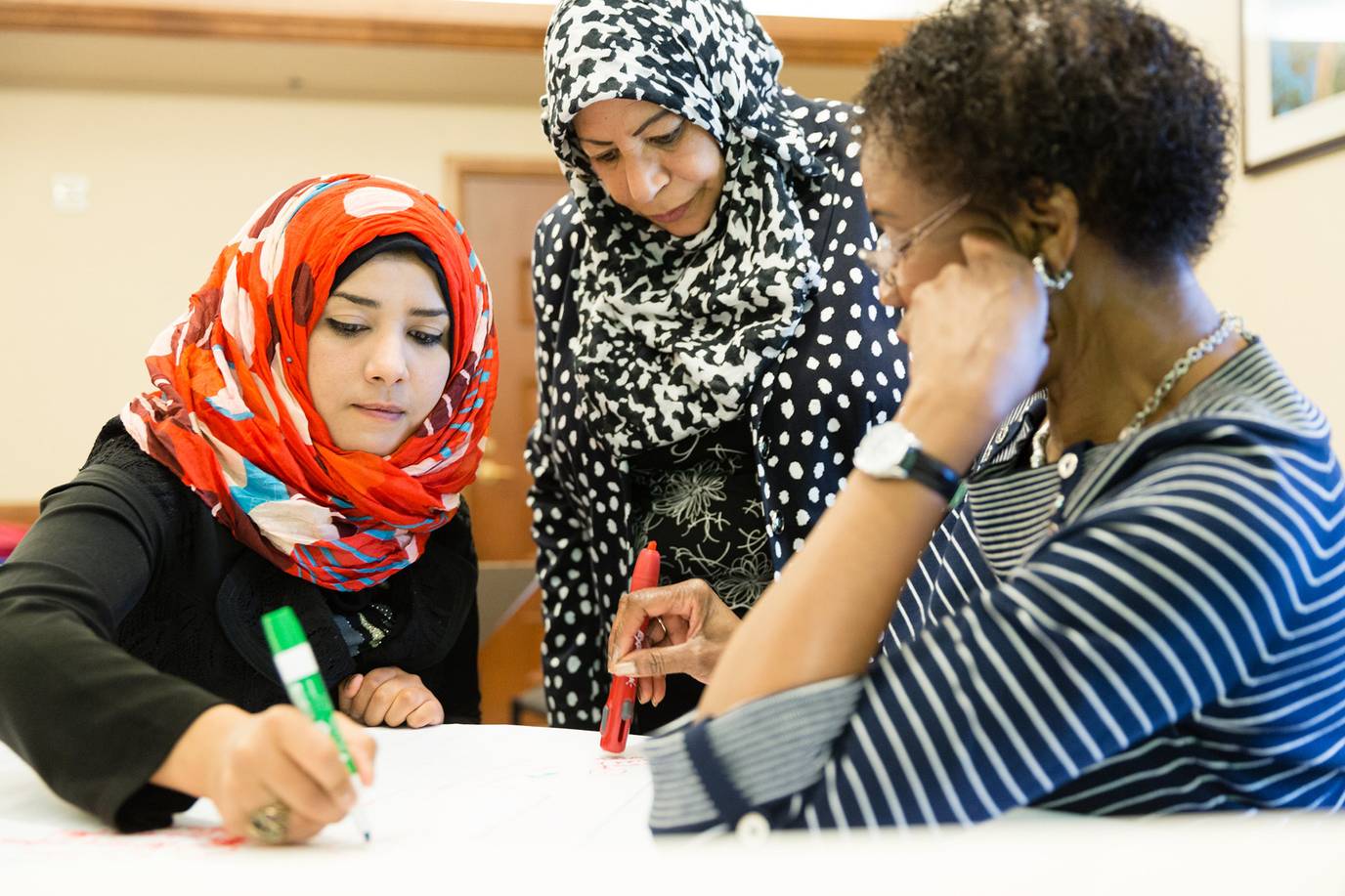
Celebrating 10 years of international impact, the Global Links Initiative builds cross-cultural bridges between Rollins and women entrepreneurs in the developing world.
Female entrepreneurs are critical to solving some of the world’s greatest challenges, including the United Nations Sustainable Development Goals (SDGs) to advance gender equality and eliminate poverty. In emerging economies, however, businesswomen often lack resources and support.
An innovative program through Rollins’ Crummer Graduate School of Business, the Global Links Initiative (formerly known as the Global Links Scholar Program) is in its 10th year of building bridges across cultures to nurture women-run ventures, creating a virtuous cycle among scholars, students, and entrepreneurs and a powerful global ripple effect.
Since its inception, the program has hosted four scholars from Iraq, India, and Brazil, engaging 5,000 students and reaching 150 women entrepreneurs thus far. With a generous $500,000 sponsorship from the Rick and Susan Goings Foundation, the program is now expanding into Latin America.
“We’re changing the lives of professors, who are changing the lives of students, who are changing lives of the entrepreneurs,” says Mary Conway Dato-on, the George D. and Harriet W. Cornell Professor of International Business and Social Entrepreneurship and the Global Links faculty director. “I don’t know of another program that has that touchpoint.”
The origins of the public-private initiative date back to a 2011 trip to Baghdad when Rick Goings ’12H and Elinor Steele ’01MBA were tasked by the Department of Defense to explore sustainable business opportunities for women in Iraq. A decade later, Global Links is reaching upwards of 172,000 people and welcoming a new scholar to campus this semester. Marielza Rita Cavallari, a professor of marketing and business strategy at ESPM university in São Paulo, Brazil, brings her expertise in marketing strategy and a diverse background of corporate experience at Kellogg’s and Pirelli.
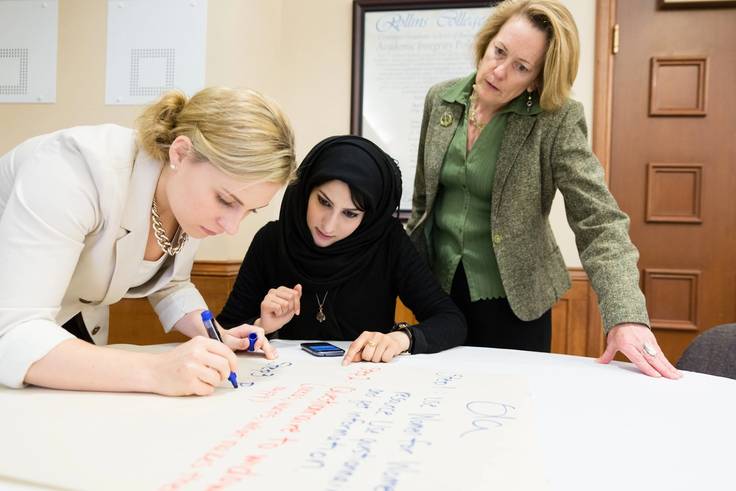
How It Works
The Global Links Initiative’s unique “train the trainer” approach creates a community of expertise and support around women entrepreneurs. Some of these women run beauty salons and cafes. Others craft handbags, dresses, toys, or jewelry. Some work with eco-friendly materials like jute or make use of fabric scraps that would otherwise go to waste.
Women who run microbusinesses are an economic backbone in emerging nations, yet they often lack the time and space to grow professionally, and some face cultural stigmas against working outside the home. It’s essential for them to develop skills in creating a business plan, crafting a marketing strategy, and managing inventory.
“It’s really focusing on this entrepreneur and making sure that you’re giving her all the attention she needs to completely transform her life,” says Yasmin Mesbah, program manager of the Global Links Initiative.
In the first of three phases of the program, a visiting scholar immerses in U.S. culture, engaging in graduate-level courses and social entrepreneurship training at Crummer. During phase two, she returns to her home country with new tools to train her students, who work hand in hand with entrepreneurs. The final phase then comes full circle, bringing the scholar back to the Rollins campus with a select group of students. Together, they deepen their skills and exchange ideas in a two-week, cross-cultural immersion supporting social entrepreneurship.
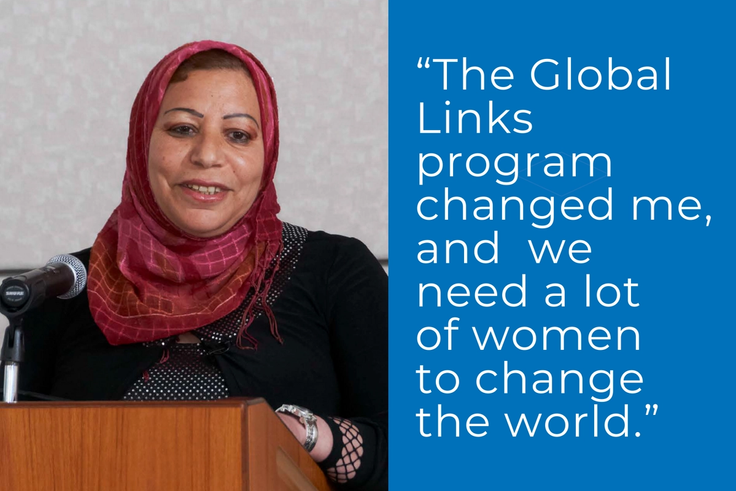
Then and Now: Amel Abed Mohammed-Ali
Global Links’ pioneering scholar, Amel Abed Mohammed-Ali, ran the industrial management department at Babylon University in Iraq when she arrived at Rollins in January 2012. It was only weeks after U.S. troops had left her home nation after an eight-year occupation.
Graduate courses at Crummer in operations management and negotiation helped Mohammed-Ali develop new teaching approaches to benefit her students when she returned to Babylon. She worked with experts at Rollins to bring plans for a career placement curriculum and an alumni center back to the University of Babylon, where she received a promotion to dean.
“It changed me; my spirit feels different,” says Mohammed-Ali of her time at Rollins, which deepened her appreciation for how vital women entrepreneurs are to Iraq’s economy. “We need a lot of women to change the world.”
The three students she later brought from Iraq to Rollins for the third phase of Global Links have also reached impressive levels of success, including completing a master’s degree, becoming a college lecturer, and launching startups. Mohammed-Ali is now carrying forward her learnings with 300 students at Al-Mustaqbal University College.
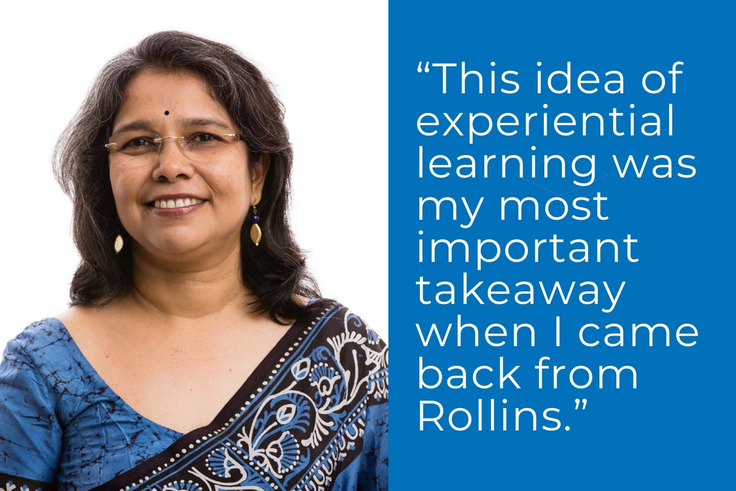
Then and Now: Sharmistha Banerjee
Sharmistha Banerjee, a business management professor at the University of Calcutta, was eager to broaden her teaching frontiers after serving as a Fulbright Scholar in South Korea and Kenya. She joined Global Links in 2014.
Exposure to Crummer’s hands-on learning, networking events, and community leadership led her to integrate these elements into her teaching.
“This idea of experiential learning was my most important takeaway when I came back from Rolins,” says Banerjee, who introduced social entrepreneurship to the curriculum at the University of Calcutta for the first time.
“I realized that one has to look empathetically at the perspective of the entrepreneurs, and only then can one be a good manager,” says Banerjee, who found fertile ground for supporting socially responsible businesses in her region.
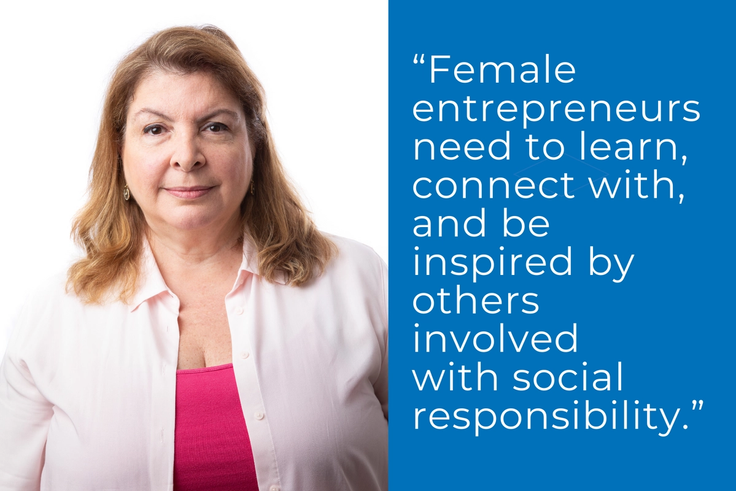
Then and Now: Denise Delboni
For three decades, Denise Delboni has served as a professor of labor law, compliance, and labor and employment relations at Brazilian higher-education institutions like FGV and ESPM. She has also worked with programs assisting underserved businesswomen.
Upon completing phase one of Global Links, Delboni returned to Brazil, where she helped coordinate a project to support small companies, infusing lessons of social responsibility and enabling her students and entrepreneurs to better market to and serve their customers.
“I’m still in contact with people I knew through Global Links, and I intend to make connections to expand the program here,” says Delboni. “The female entrepreneurs need to learn and be inspired by others involved with social responsibility. They have to be connected to other women looking for social causes.”
Delboni is hoping to return to Winter Park this fall with five students for phase three of Global Links, ultimately helping more microbusiness leaders in Brazil explore new perspectives and markets.
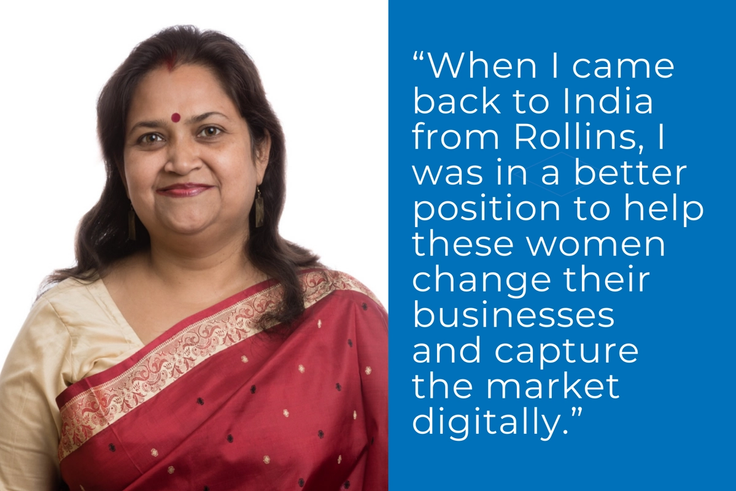
Then and Now: Rumpa Chakraborty
Rumpa Chakraborty, a professor of finance and accounting at Shri Shikshayatan College in Calcutta, India, has taught for two decades, but translating classroom entrepreneurship lessons into real-world practices proved challenging.
The entrepreneurs she has worked with lead companies, including an organic food venture, a recycled-fabric fashion label, and a handcrafted jewelry brand. As innovative and experienced as these women are, they struggle to keep business and household expenses separate.
“They are from such a grassroots level that what they earn is required to maintain their family,” says Chakraborty. “When I came back to India from Rollins, I was in a better position to give them new thoughts about what changes they could bring to their business and how they can capture the market digitally.”
After returning to Calcutta following phase three of Global Links, Chakraborty and one of her former graduate assistants launched a Summer Flea Market and other events to help the local entrepreneurs reach a broader market, increasing sales and polishing their operations. In 2019, they started a nonprofit organization, For Me and By Me Foundation, whose virtual presence became a lifeline during the COVID-19 pandemic.
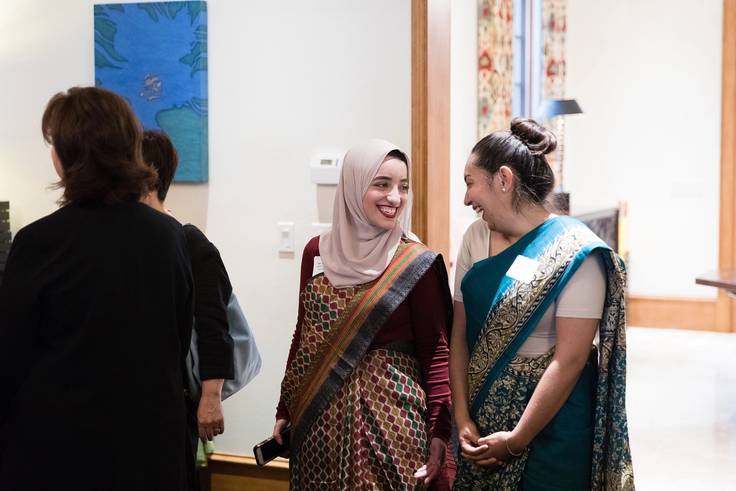
Expanding the Reach
While travel was on hold during the COVID-19 pandemic, the Global Links Initiative expanded its virtual audience to an impressive 172,000 participants by creating webinars featuring experts in global entrepreneurship.
The 90-minute interactive discussions livestreamed via Zoom and Facebook, fostering scholarship, business skills, and a global community by focusing on topics like investing for impact, branding for entrepreneurs, and designing for social change.
With its latest support from the Goings Foundation, the Global Links Initiative is set to expand into Latin America from its established base in Brazil over the next five years. The program will build on its relationships with universities and nonprofits to establish future partnerships in Mexico and Colombia.
“Now that we have 10 years, we have a proven concept,” says Conway Dato-on. “We’re going to have some very strong metrics that we’ll be able to use to go and speak to companies who will sponsor the work in addition to the Rick and Susan Goings Foundation because they understand that supporting female entrepreneurs creates a stronger ecosystem in their countries.”
Read More
April 22, 2024
Fetscherin Ranked in List of World’s Top Business Scientists
Business professor Marc Fetscherin has been ranked among the world’s best business and management scientists in Research.com’s 2024 global ranking.
April 22, 2024
Celebrating Earth Day: Perspective from the Rollins Greenhouse
Rollins College Greenhouse Coordinator Zari St Jean shares how you can invite more greenery into your life for Earth Day.
April 17, 2024
Makayle Kellison ’24 Earns Goldwater Scholarship
Makayle Kellison ’24 has earned a Goldwater Scholarship, the country’s most prestigious undergraduate scholarship for the STEM fields.
